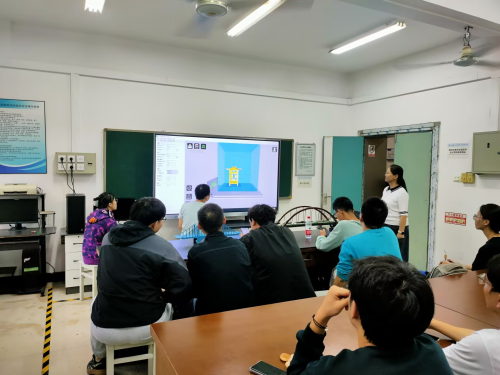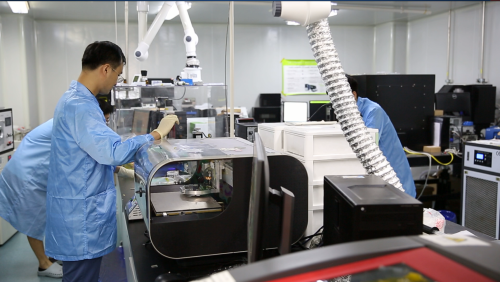The School of Materials Science and Engineering at Wuhan Technology of University offers a comprehensive suite of undergraduate programs covering the first-level discipline of Materials Science and Engineering. The eight undergraduate programs include:
Materials Science and Engineering
Inorganic Non-metallic Materials Engineering
Composite Materials and Engineering
Polymer Materials and Engineering
Materials Physics
Materials Chemistry
New Energy Materials and Devices
Materials Forming and Control Engineering.
All eight programs have achieved national recognition:
Each is designated as a National First-Class Undergraduate Program under the "Double Ten-Thousand Plan."
One program is recognized as a National-level Characteristic Program.
Three programs are accredited as Outstanding Engineer Education and Training Program of Ministry of Education in China.
All eight programs have successfully obtained accreditation from the China Engineering Education Accreditation Association.
The School maintains a long-standing commitment to educational reform and innovation, having undertaken over 40 national and provincial/ministerial-level teaching and research projects. It has established two national-level teaching teams and five teaching teams at the Hubei provincial level. Since 2009, the School has received seven national teaching achievement awards and 17 provincial teaching awards. Additionally, it has developed nine national first-class courses and seven provincial first-class courses, contributing to a robust portfolio of high-quality educational offerings.



Materials Science and Engineering
This program is recognized as a national first-class undergraduate program, a national-level characteristic program, and a brand program in Hubei Province. It is supported by the university's Materials Science and Engineering discipline, rated A+ nationally, ranks in the top 1‰ globally according to ESI, and is part of the Double First-Class Initiative. With a long-standing history, this broad-based program integrates materials science, engineering, physics, and chemistry. It focuses on materials synthesis, structure, processing, properties and applications, serving industries such as energy, transportation, automotive, shipping, military, and aerospace, thereby contributing to the development of New Quality Productive Forces.
Core and Characteristic Courses:
Introduction to Materials
Fundamentals of Materials Science B
Fundamentals of Materials Engineering
Material Preparation and Structural Properties Experiment
Physical Chemistry D
Solid State Physics D
Solid State Chemistry
Calculation Materials
Materials Physics
Materials Physics is an interdisciplinary program focusing on the structure, properties, and applications of materials. It addresses the national and regional demands for new materials in electronics, communication, and optoelectronics. Grounded in mathematics, physics, and materials science, the program delves into key materials and technologies for information acquisition, transmission, and storage. Graduates develop international perspectives, innovative thinking, and practical skills to work in fields such as electronic components, semiconductor materials, fiber-optic sensing materials, and optoelectronic materials.
Core and Characteristic Courses:
Theoretical Physics
Fundamentals of Materials Science
Solid State Physics
Materials Physics
Methods of Materials Research and Testing
Theory and Computational Methods for Materials Design
Comprehensive Experiments on Functional Materials
Materials Chemistry
Materials Chemistry integrates natural sciences, materials science, materials chemistry, and engineering applications, tackling theoretical and practical problems including material computation, process design, synthesis and preparation, service behavior analysis and control, modification, development and production of new materials and devices, system integration, and management. The program targets applications in new materials, information and microelectronics, new energy, automotive, new building materials, and environmental protection, cultivating high-level research and engineering professionals for strategic emerging industries.
Core and Characteristic Courses:
Fundamentals of Materials Science B
Principles of Materials Chemistry
Computational Materials Chemistry B
Advanced Technology of Materials Preparation
Methods of Materials Research and Testing B
Experiments on Materials Chemistry Synthesis and Characterization D
Materials Physics
New Energy Materials and Devices
This interdisciplinary program is based on natural sciences, materials science, and energy science, addressing needs in new energy, new materials, new energy vehicles, energy conservation, environmental protection, and high-end equipment manufacturing. It focuses on key materials and technologies for renewable energy conversion and storage—such as solar cells, ion batteries, fuel cells, and supercapacitors—and trains professionals for research and development, structure and performance analysis, device design and manufacturing, technological improvement, and project management in related fields.
Core and Characteristic Courses:
Fundamentals of Materials Science
Solid State Physics
Materials Physics
Fundamentals of Semiconductor Physics
Methods of Materials Research and Testing
Experiments on Preparation and Properties of New Energy Materials
Experiments on Assembly of New Energy Materials and Devices
Device Design Training
Electrochemical Principles and Applications
Inorganic Non-metallic Materials Physics
Grounded in mathematics, physics, and chemistry, this program serves applications in energy, transportation, information, communication, construction, and other multidisciplinary fields. It focuses on two main areas: basic and functional inorganic non-metallic materials and cultivates engineering and technical professionals, scientific researchers, and industry leaders capable of research and applications in this domain.
Core and Characteristic Courses:
Inorganic Chemistry B
Physical Chemistry D
Fundamentals of Materials Science B
Fundamentals of Materials Engineering
Solid State Physics
Materials Analysis and Characterization
Inorganic Non-metallic Materials Engineering A
Experiments on Materials Innovation Design
Advanced Preparation Technology of Inorganic Non-metallic Materials
Design and Project Management of Inorganic Non-metallic Materials Factories
Experiments on Materials Preparation and Properties
Engineering Design Training
Composite Materials and Engineering
This interdisciplinary program covers materials science and mechanics, addressing the development, structural design, preparation, molding, application, and maintenance of composite materials and equipment. It emphasizes engineering applications crucial for national defense, aerospace, marine and rail transportation, and energy sectors, with applications in fighter jets, large aircraft, high-performance ships, new energy vehicles, and wind turbine blades.
Core and Characteristic Courses:
Polymer Chemistry
Polymer Physics
Methods of Materials Research and Testing
Principles of Materials Compositing
Mechanics of Composite Materials
Composite Materials Polymer Matrix
Technologies and Equipment of Composite Materials
Polymer Materials and Engineering
This program cultivates professionals engaged in polymer product development, process and equipment design, production technology, and project management. Graduates are expected to have international perspectives and sustainable development awareness, ready to adapt to rapid societal advancements.
Core and Characteristic Courses:
Polymer Chemistry A
Polymer Physics A
Organic Chemistry C
Physical Chemistry D
Fundamentals of Materials Chemical Engineering B
Principles and Technology of Polymer Processing
Methods of Materials Research and Testing B
Materials Forming and Control Engineering
This interdisciplinary program is based on materials science and mechanical engineering, integrating information science, computer technology, and intelligent control. Leveraging the university’s automotive, transportation, and building materials strengths, it serves national strategic emerging industries and the transformation of traditional industries. It focuses on green design, intelligent forming, digital manufacturing, and quality control, cultivating versatile technical professionals with social responsibility, innovation, practice, and global vision.
Core and Characteristic Courses:
Fundamentals of Materials Science
Metal Heat Treatment
Principles of Materials Forming
Fundamentals of Materials Forming Control and Engineering
Fundamentals of CAD/CAM
Fundamentals of Testing Techniques
Principles of Transport Phenomena in Materials Processing
Modern Materials Forming Technology
Processing Techniques and Mold Design for Polymer Materials
Equipment and Automation for Materials Forming
Industrial Tooling and Mold CAD
Integrated CAD/CAM Experiment in Materials Forming
Integrated CAE Experiment in Materials Forming
Integrated Experiment on Forming Quality Inspection and Analysis
Frontier Courses Module



